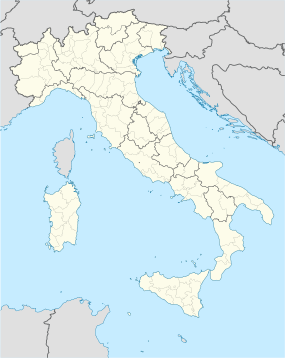Scylletium
| Σκυλλήτιον Scolacium |
|

Remains of Amphithéâtres of Scolacium.
|
|
| Location | Borgia, Calabria, Province of Catanzaro, Calabria, Italy |
|---|---|
| Region | Magna Graecia |
| Coordinates | 38°48′33″N 16°35′44″E / 38.80917°N 16.59556°ECoordinates: 38°48′33″N 16°35′44″E / 38.80917°N 16.59556°E |
| Type | Settlement |
| Site notes | |
| Excavation dates | 1982 |
| Management | Soprintendenza per i Beni Archeologici della Calabria |
| Website | ArcheoCalabriaVirtual (Italian) |
Scylletium was an ancient seaside city in Calabria, southern Italy. Its ruins can be found at the frazione of Roccelletta, in the comune of Borgia, near Catanzaro, facing the Gulf of Squillace.
Scylletium was situated on the east coast of Calabria (ancient Bruttium), on the shores of an extensive bay, to which it gave the name of Scylleticus Sinus. It is this bay, still known as the Gulf of Squillace (Italian: Golfo di Squillace), which indents the coast of Calabria on the east as deeply as that of Hipponium or Terina (the Gulf of Saint Eufemia, Italian: Golfo di Sant'Eufemia) does on the west, so that they leave but a comparatively narrow isthmus between them. According to a tradition generally received in ancient times, Scylletium was founded by an Athenian colony, a part of the followers who had accompanied Menestheus to the Trojan War. Another tradition was, however, extant, which ascribed its foundation to Ulysses. But no historical value can be attached to such statements, and there is no trace in historical times of Scylletium having been a Greek colony, still less an Athenian one. Its name is not mentioned either by Scylax or Scymnus Chius in enumerating the Greek cities in this part of Italy, nor is there any allusion to its Athenian origin in Thucydides at the time of the Athenian expedition to Sicily. We learn from Diodorus that it certainly did not display any friendly feeling towards the Athenians. It appears, indeed, during the historical period of the Greek colonies to have been a place of inferior consideration, and a mere dependency of Crotona, to which city it continued subject until it was wrested from its power by the elder Dionysius, who assigned it with its territory to the Loerians. It is evident that it was still a small and unimportant place at the time of the Second Punic War, as no mention is found of its name during the operations of Hannibal in Bruttium, though he appears to have for some time had his headquarters in its immediate neighborhood, and the place called Castra Hannibalis must have been very near to Scylletium.
...
Wikipedia

